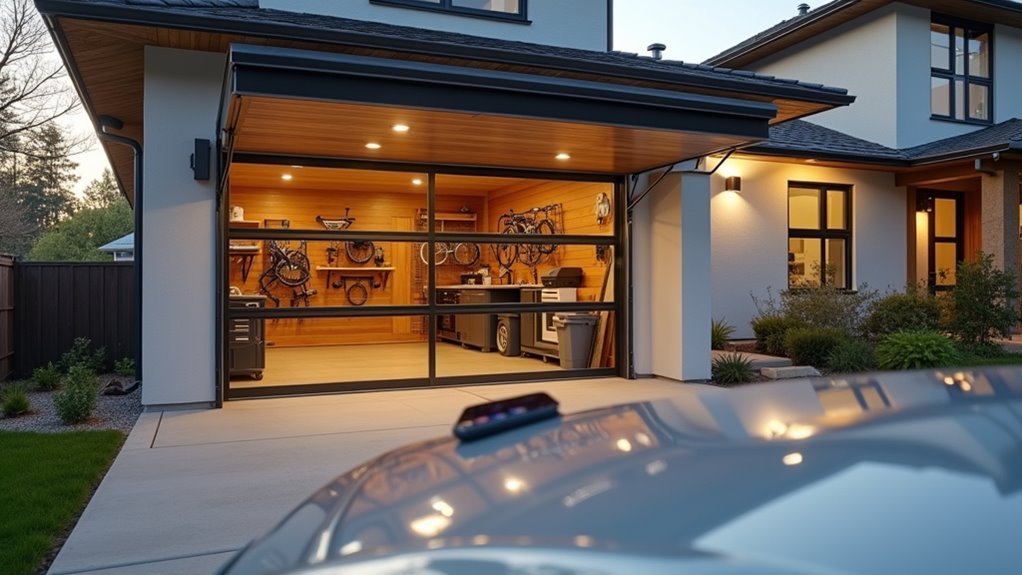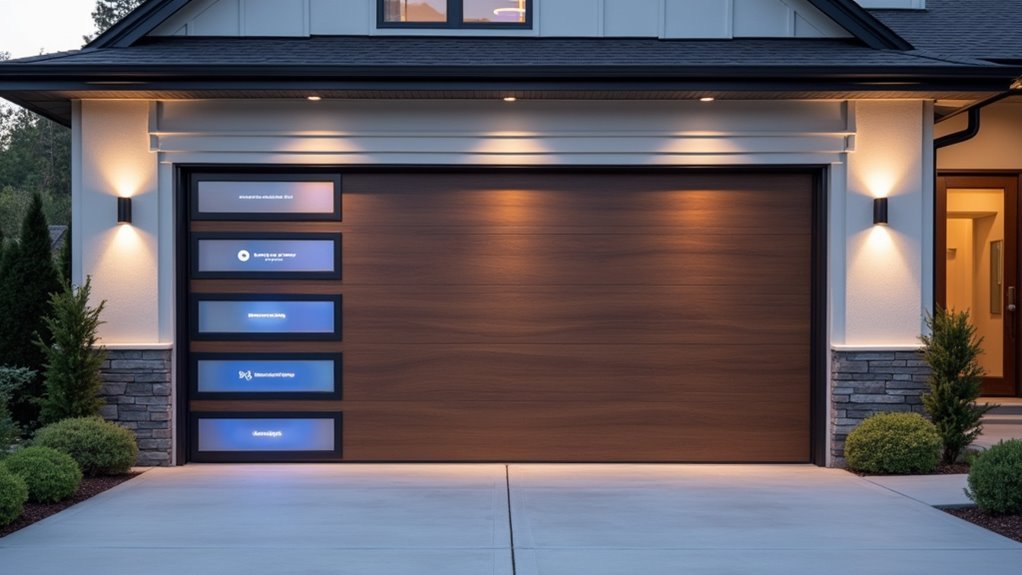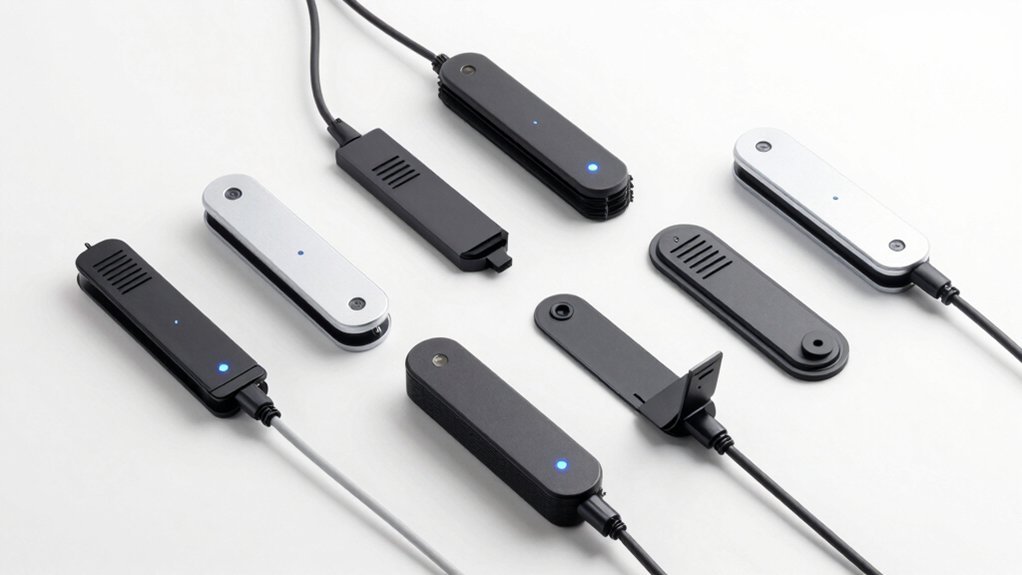You’re probably wondering if paying monthly for your garage door’s smart features makes financial sense. These subscription plans promise convenience through remote access and real-time alerts, but they’ll cost you anywhere from $3 to $15 per month depending on what you choose. While basic door opening and closing might work without fees, the advanced monitoring and automation features that actually make these systems valuable often sit behind that paywall.
Understanding Smart Garage Door Subscription Models

While you can operate many smart garage doors without paying ongoing fees, subscription models have become increasingly common as manufacturers seek to monetize advanced features and cloud-based services.
Companies like myQ offer tiered pricing structures, with subscription costs ranging from $45 annually to $299 for decade-long plans. These models differentiate between basic functionality and premium features.
Without subscriptions, you’ll retain essential garage door operation capabilities, but you’ll lose advanced integrations, particularly with vehicles like Tesla.
The subscription grants access to cloud database management, real-time notifications, and live video streaming features that enhance security and convenience.
Manufacturers justify these fees by providing ongoing server maintenance, software updates, and premium connectivity services that free versions simply can’t support economically.
Annual Vs Multi-Year Pricing Strategies
Smart garage door manufacturers structure their subscription pricing to balance immediate accessibility with long-term customer retention through strategic cost incentives.
When you’re considering myQ Works, you’ll find annual subscription plans starting around $45 yearly, giving you budget flexibility and the chance to test service value.
However, multi-year pricing offers substantial savings that shouldn’t be ignored. A 5-year plan at $179 drops your effective annual cost to approximately $35.80, while the 10-year option at $299 reduces it further to roughly $29.90 annually.
You can leverage the 30-day free trial to assess whether committing to longer terms makes financial sense for your specific garage door management needs and usage patterns.
Core Features Included in Basic Plans

When you’re considering a basic garage door subscription plan, you’ll get three essential features that transform how you interact with your garage.
Remote access control lets you operate your door from anywhere through your smartphone, while real-time monitoring alerts notify you instantly of any activity.
Mobile app integration ties everything together, giving you a centralized platform to manage your garage door’s security and convenience features.
Remote Access Control
How can basic garage door subscription plans transform your everyday access experience? You’ll gain complete remote access control over your garage door from anywhere using your smartphone. These subscription services, like myQ, let you open and close your garage door instantly through a mobile app, eliminating the need for traditional remotes.
| Remote Access Feature | Benefit |
|---|---|
| Mobile app control | Open/close from anywhere |
| Real-time notifications | Instant door status updates |
| Virtual guest passes | Temporary visitor access |
You’ll receive immediate alerts when your door opens or closes, providing peace of mind whether you’re at work or traveling. The virtual guest pass feature enables you to grant temporary access to delivery drivers, family members, or service providers without sharing permanent codes.
Real-Time Monitoring Alerts
Because your garage door operates as a critical entry point to your home, basic subscription plans equip you with extensive real-time monitoring alerts that instantly notify you of any door activity.
You’ll receive immediate notifications for door openings, closings, and unauthorized access attempts, providing enhanced security through constant awareness of your garage door status.
These alerts integrate seamlessly with the myQ Community App, delivering cloud-based notifications directly to your smartphone.
You’ll maintain 24/7 access to thorough reports and alerts, ensuring continuous oversight of your garage operations.
Basic plans allow you to customize alert settings according to your specific preferences and security needs.
This real-time monitoring capability transforms your garage door into an intelligent security component, keeping you informed whether you’re home or away from your property.
Mobile App Integration
Your myQ mobile app serves as the central command center for all garage door operations, bundling extensive control features directly into your smartphone. The app enables complete remote garage door operation from any location with internet connectivity.
| Feature | Capability |
|---|---|
| Door Control | Open/close garage doors remotely |
| Guest Access | Create virtual passes for visitors |
| Status Monitor | View real-time door position |
You’ll receive real-time alerts whenever your garage door opens or closes, providing constant security awareness. The mobile app streamlines visitor management through virtual guest passes, eliminating the need for physical keys or direct communication with guests. Integration with property management software like RealPage and Yardi enhances operational efficiency for multi-unit properties, making access control seamless for both residents and property managers.
Premium Features and Add-On Services

While basic garage door automation offers convenient remote access, MyQ’s premium subscription plans grant access to an extensive suite of advanced features that transform your garage into a smart security hub.
These premium features include cloud database management for thorough activity tracking and real-time alerts that keep you informed of all garage door activity. You’ll also get live video streaming capabilities, allowing you to monitor your property remotely with enhanced visual security.
Virtual guest passes represent another valuable premium feature, enabling you to grant temporary access to visitors without direct communication. This proves especially beneficial for property managers handling multiple tenants.
Additionally, you can add extra access points to your subscription plans as needed, customizing your security setup to match your property’s specific requirements and expanding coverage across multiple entry points.
Free Trial Periods and Initial Setup Costs
You’ll typically get a 30-day free trial with garage door subscription services like myQ, giving you enough time to test all features before committing to a paid plan.
Your initial setup won’t break the bank, as you’ll need to purchase a myQ hub and sensor ranging from $30 to $100 depending on your retailer and included accessories.
These upfront hardware costs are separate from your annual subscription fees, which can start as low as $45 per year for continuous remote access.
Trial Duration Benefits
When you’re considering a garage door subscription service, MyQ’s 30-day free trial eliminates the financial risk of committing to a plan that mightn’t meet your needs.
You’ll have enough time to thoroughly test all features and determine whether the app integrates seamlessly with your existing garage system. This trial period lets you evaluate the user interface, connectivity reliability, and overall functionality before paying subscription fees.
The month-long duration provides ample opportunity to experience real-world usage scenarios, from daily commutes to vacation monitoring. You can assess whether MyQ’s remote access, notifications, and security features justify the annual costs ranging from $45 to $179.
If the service doesn’t meet your expectations, you can cancel without any financial obligation, making it a genuinely risk-free evaluation period.
Hardware Installation Expenses
Beyond the subscription fees you’ll evaluate during your free trial, upfront hardware costs represent the most significant initial investment for garage door smart systems.
You’ll typically spend $30 to $100 on myQ hardware, including the hub and necessary sensors for your specific garage door setup.
Installation costs can dramatically impact your total investment. If you’re comfortable with DIY projects, you can avoid professional installation fees that often exceed $150.
The myQ system’s design allows most homeowners to complete setup independently using basic tools and clear instructions.
However, complex garage door configurations or multiple doors might require professional assistance.
When comparing subscription plans, factor these one-time hardware and installation costs alongside annual fees to determine your system’s true value proposition over time.
Comparing MyQ to Competitor Pricing
While MyQ’s subscription plans start at $45 annually with a discounted 5-year option at $179, you’ll find several alternatives that don’t require ongoing payments.
LiveKey offers completely free garage control, eliminating the subscription fees that MyQ demands for full functionality. HomeLink operates through radio frequency instead of WiFi, requiring only a one-time purchase without recurring charges.
Many users hesitate to commit to MyQ’s subscription model when they can operate garage doors manually or integrate them through other free smart home systems.
Users often prefer operating garage doors manually rather than paying for MyQ’s ongoing subscription fees.
You should consider whether MyQ’s convenience features justify the ongoing costs compared to these no-fee alternatives. While MyQ provides enhanced functionality through its subscription plans, competitors offer viable solutions that eliminate recurring expenses entirely.
Hardware Requirements and Additional Expenses
Although myQ’s subscription fees grab most attention, you’ll face significant upfront hardware costs that can substantially increase your total investment. The myQ system requires specific hardware that extends beyond basic subscription costs.
Your hardware requirements include a myQ hub and sensor, with installation costs varying based on complexity. Tesla integration demands compatible equipment that won’t work with older vehicle models. Professional installation may be necessary for peak functionality, adding to your expenses.
| Cost Category | Price Range |
|---|---|
| myQ Hub & Sensor | $50-$150 |
| Professional Installation | $75-$200 |
| Additional Access Points | $25-$100 |
| Tesla Compatibility Kit | $100-$300 |
| App Licenses (Multiple Properties) | $10-$50/year |
Consider these hardware requirements and installation costs when evaluating myQ’s true value proposition for your garage door automation needs.
Tesla Integration and Vehicle Compatibility
Tesla’s myQ integration transforms how you control your garage door directly from your vehicle’s touchscreen, but compatibility depends entirely on your car’s model year and generation.
Unfortunately, if you own an older Model S or Model X, you’re out of luck. The integration only works with newer Tesla models, including Model 3, Model Y, and 2021+ Model S and Model X vehicles.
However, there’s a significant limitation you should know about:
- The integration only controls garage doors—your myQ gates, cameras, and lights won’t work
- You’ll need a subscription ranging from $45 annually to $299 for ten years
- Legacy Tesla models are completely incompatible, leaving many owners frustrated
- Tesla uses radio frequency while myQ relies on WiFi, creating operational complications
Alternative Solutions Without Subscription Fees
If you’re frustrated with myQ’s subscription fees, several compelling alternatives can eliminate those recurring costs entirely. You can explore the LiveKey App, which offers free garage door control without subscription burdens. HomeLink provides a one-time installation for manual operation, appealing to users seeking cost-effective solutions.
| Solution | Cost Model | Smart Home Integration |
|---|---|---|
| LiveKey App | Free | Limited |
| HomeLink | One-time fee | Manual operation |
| Basic MyQ | No subscription | Restricted features |
Some users successfully use myQ’s basic functionalities without subscriptions, accessing limited features for free. Previously available integrations with Alexa and Google still attract users preferring non-subscription solutions. Community discussions reveal growing sentiment against subscription models, encouraging exploration of alternatives that open your garage without recurring charges for basic functionalities.
Homelink Vs Wifi-Based Systems Cost Analysis
Two distinct cost structures define the garage door control market, with HomeLink’s one-time installation fee standing in sharp contrast to WiFi-based systems’ recurring subscription models.
When you’re deciding how to close garage doors remotely, the financial implications become essential.
HomeLink offers reliable direct communication without ongoing fees, while myQ requires annual subscriptions ranging from $45 to $299 for ten years. This creates a significant long-term cost difference that impacts your budget.
HomeLink’s no-fee structure delivers substantial savings compared to myQ’s costly annual subscriptions over time.
Consider these emotional factors when choosing:
- Financial freedom – No recurring fees draining your wallet monthly
- Reliability anxiety – Internet dependency causing potential access failures
- Subscription fatigue – Another bill adding to your monthly expenses
- Peace of mind – Consistent access without service interruptions
HomeLink’s one-time investment proves more economical for long-term garage door control.
Community and Multi-Unit Property Plans
While individual homeowners weigh subscription costs against one-time purchases, property managers face entirely different considerations when implementing garage door control systems across multiple units.
myQ’s community subscription plans scale from small properties (2-9 units) to high-rise complexes (50+ units), starting at $43 monthly for base packages. You’ll pay additional costs based on access points and selected features.
The platform streamlines operations through 24/7 reporting, automated alerts, and seamless integration with property management software like RealPage and Yardi.
Your residents gain smartphone-enabled remote access to doors, elevators, and garages, plus video clip playback for enhanced security.
You’ll modernize guest entry processes while maintaining operational efficiency across multiple units, making the subscription model particularly valuable for community-wide implementation.
Hidden Costs and Long-Term Financial Impact
You’ll often find that garage door subscription prices don’t stay fixed, with many providers raising rates annually or after promotional periods end.
Multi-year plans might seem like bargains upfront, but they lock you into contracts that become increasingly expensive as competitors offer better deals.
These escalating costs can trap you in agreements where you’re paying considerably more than newer customers while having no easy way to switch providers.
Subscription Price Escalation
Although MyQ’s initial subscription prices appear reasonable at $45 annually, the long-term financial reality tells a different story that can catch homeowners off guard.
What seems like manageable yearly fees can quickly spiral into substantial expenses when you factor in price increases, additional features, and extended usage periods.
Subscription services rarely maintain their introductory pricing, and you’ll likely face escalating costs as companies expand their offerings or adjust their pricing models.
These incremental increases compound over time, transforming what appeared to be an affordable smart home solution into a significant recurring expense that exceeds your initial budget projections.
- Your $45 annual fee could double within five years through gradual price hikes
- Additional family members or devices often require separate subscription tiers
- Premium features you didn’t initially need become “essential” upgrades with additional costs
- Canceling means losing functionality you’ve grown dependent on
Multi-Year Plan Traps
Multi-year garage door subscription plans like myQ’s 5-year option at $179 or 10-year plan at $299 appear to offer significant savings compared to annual renewals.
However, these extended commitments often transform into financial traps that lock you into outdated technology and unexpected expenses.
You’ll discover hidden costs through required hardware like myQ hubs and sensors that weren’t factored into your initial calculations.
These additional expenses can quickly erode any perceived savings from bulk pricing.
Technology evolves rapidly, making your 10-year commitment potentially obsolete within years.
You’re stuck paying for services that newer, better alternatives might provide more affordably.
If you don’t fully utilize the features, you’re fundamentally paying for unused functionality while being unable to switch to more suitable options without forfeiting your investment.
User Experiences and Value Perception
How do actual users feel about paying $45 annually for garage door remote access when free alternatives exist? The community’s split on myQ’s value proposition reveals deep frustration with subscription models in this space.
You’ll find users successfully operating without subscriptions, questioning why they should pay for basic functionality that competitors offer free.
The sentiment against recurring fees runs strong, with many comparing myQ’s $45 annual cost unfavorably to free options like LiveKey App and HomeLink.
Users consistently debate whether convenience justifies ongoing costs, especially when similar systems don’t charge subscription fees.
The ongoing debate centers on whether paying annually makes sense when competitors deliver identical features at no cost.
- You’re paying annually for features that should be included with your hardware purchase
- Free alternatives provide the same remote access without ongoing financial commitment
- Your garage door opener becomes hostage to subscription renewals for basic functionality
- Community members actively organize against these “unfair” recurring charges
Making the Decision: When Subscriptions Pay Off
Despite widespread criticism of subscription models, certain scenarios make myQ’s annual fee worthwhile for specific users.
You’ll find the $45 annual cost justified if you frequently travel and need reliable remote garage access monitoring. The subscription proves valuable when you’re managing rental properties or frequently providing access to service professionals, housekeepers, or family members through virtual guest passes.
If you live in a gated community where seamless integration enhances security protocols, the enhanced features justify the expense. You should also consider the 10-year plan at $299 if you’re planning long-term residence, as it reduces annual costs considerably.
However, you might prefer HomeLink’s one-time purchase or LiveKey’s free options if you only need basic garage control without advanced monitoring capabilities.
Frequently Asked Questions
How Much Is the Myq Monthly Subscription?
You’ll pay $43 monthly for myQ’s basic subscription with extensive access management features. Advanced security plans can cost up to $100 monthly, depending on your property’s access points and licenses needed.
Are Garage Door Upgrades Worth It?
You’ll find garage door upgrades worthwhile if you value convenience and security. They provide remote smartphone control, real-time alerts, and enhanced property value, though you’ll need to weigh initial costs against long-term benefits.
How Much Does It Cost to Program a Garage Door?
You’ll pay $45-299 annually for myQ programming subscriptions, depending on your plan length. Basic app control is free, but enhanced vehicle integration requires paid plans. Additional hardware costs may apply for initial setup.
Are Garage Doors a Good Investment?
You’ll find garage doors are excellent investments since they boost your home’s curb appeal, enhance security, and increase property value. Smart features attract tech-savvy buyers, potentially leading to faster sales.





Leave a Reply